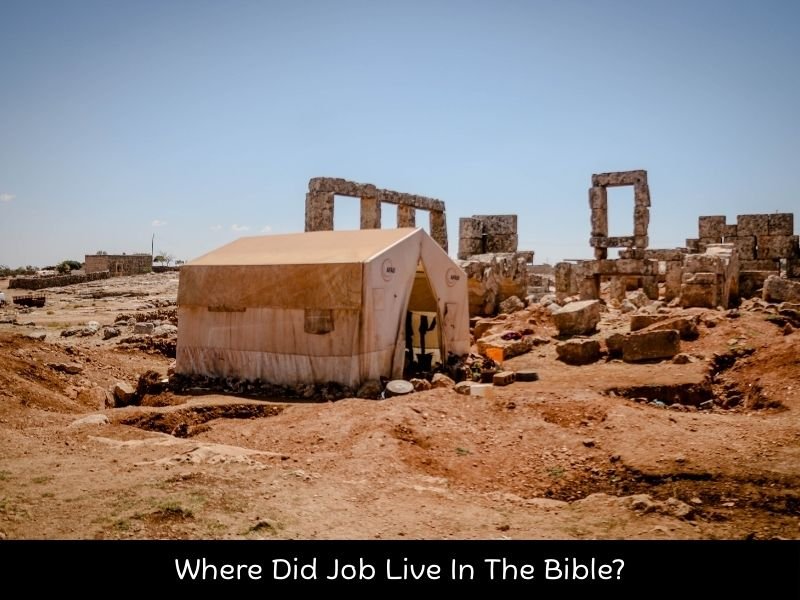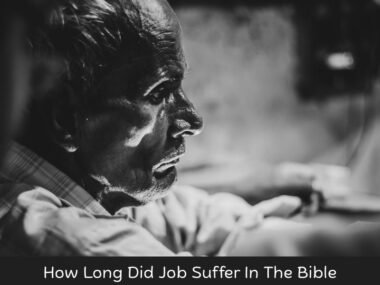Uz, the land where Job lived, is a somewhat mysterious region in the Bible. While its exact location is not definitively known, biblical scholars suggest it was situated in the ancient Near East, possibly in northern Arabia, southern Edom, or even parts of Mesopotamia.
What’s certain is that Uz was known for its semi-arid climate and desert terrain, consistent with pastoral life. Job’s residence there suggests he lived outside Israel’s traditional borders, indicating that God’s relationship with humanity extended beyond the covenant people. This makes Uz both geographically remote and spiritually significant in the biblical narrative.
Location and Topography
Uz was likely a desert or semi-desert region, with broad grazing lands suitable for livestock, which aligns with Job’s immense wealth in flocks and herds. Some scholars place Uz east of Palestine, near Edom or Aram, possibly encompassing regions near modern-day Jordan or northern Arabia.
This terrain would have been dry and rugged, creating a backdrop of hardship that mirrors the suffering Job later endures. The area likely supported nomadic and semi-nomadic lifestyles, making Job’s settled wealth stand out as unusual and impressive. The topography contributed both to Job’s prosperity and the symbolic isolation of his suffering.
Historical Context
The events in the Book of Job are set in a time before Israel’s monarchy, possibly during the patriarchal era—similar to Abraham, Isaac, and Jacob. There are no mentions of the Law of Moses or Israelite institutions, reinforcing the idea that Job lived before or outside these traditions.
This ancient context emphasizes that God’s moral governance and concern for righteousness predate formal religious structures. Job’s story is thus not only historical but also universal, showing that divine justice and human faith are timeless concerns, relevant across all eras and civilizations, including ancient cultures outside of Israel.
Cultural Landscape and Inhabitants
The cultural environment of Uz was likely tribal, with a mix of semi-nomadic groups, shepherding clans, and early settlements. These communities valued wealth, honor, and familial legacy. Job’s status as the “greatest of all the men of the east” indicates his prominence in this cultural landscape, respected for both material wealth and moral character.
The people likely practiced ancestor worship, had oral traditions, and shared communal values based on loyalty and justice. Job’s story shows how upright living and faith were respected even in non-Israelite societies, and it reveals common human questions about suffering and divine justice.
Job: A Righteous Man in Uz
Job was known for his impeccable character and spiritual integrity. Living in Uz, a region possibly outside the covenant nation of Israel, Job still maintained a strong, personal faith in God. He is described as “blameless and upright,” someone who feared God and turned away from evil. His righteousness wasn’t dependent on formal religion or law—it was internal, rooted in a genuine reverence for the divine. This sets Job apart as a man of exceptional faith, making his suffering all the more perplexing to his peers. His life in Uz becomes a stage for exploring deep spiritual questions.
Job’s Wealth and Prosperity
Job’s prosperity was vast—he owned thousands of livestock, numerous servants, and had a large, influential household. In a society where wealth was measured in animals and land, Job’s estate was impressive by any standard. His abundance was not just material; it included a large, healthy family and a reputation for wisdom and fairness.
This prosperity, especially in a land like Uz, marked him as not only blessed but socially powerful. Yet, the sudden reversal of this fortune later in the narrative serves to strip away worldly security and forces a deeper exploration of faith without material reward.
Job’s Righteousness and Faith
Job’s faith was not performative—it was deeply woven into his daily life. He regularly offered sacrifices for his children, in case they had sinned unknowingly. This shows a heart attuned to God’s holiness and human frailty.
Even after losing his children, wealth, and health, Job initially responds in reverence: “The Lord gave, and the Lord has taken away; blessed be the name of the Lord.” His faith withstands unimaginable trials, making his story one of the most compelling illustrations of integrity under pressure. Job lived in Uz, but his faith transcended regional boundaries and cultural norms.
Family and Social Influence
Job’s family structure reflected the patriarchal norms of his time—he had ten children and a household large enough to support numerous servants and dependents. His sons and daughters feasted together, suggesting unity and prosperity.
Job’s influence extended beyond his household; he was likely a community leader or elder, given the respect shown to him later in the text. He was sought after for counsel and seen as a moral compass in Uz. His loss thus not only affects him personally but also echoes across his community, highlighting the interconnected nature of family, society, and spirituality.
The Biblical and Literary Significance of Uz
Uz serves as a literary and symbolic setting in the Book of Job. By placing the story outside Israel, the Bible underscores that questions about suffering, righteousness, and divine justice are universal. Uz becomes a narrative space where human and divine interaction unfolds free from Israel’s historical-religious framework.
This allows the Book of Job to function both as wisdom literature and as a theological treatise accessible to all humanity. The foreign setting amplifies the book’s message: God’s moral order and concern are not limited to one nation but extend across all people and places.
Uz in Biblical Literature
Beyond Job, Uz is mentioned in a few scattered biblical texts, often associated with Edom or Aram. It appears in genealogies (e.g., Genesis 10:23; Genesis 22:21) and the prophetic writings (Lamentations 4:21) as a place of exile or judgment.
While sparse, these references contribute to an image of Uz as a distant, eastern land—sometimes noble, sometimes symbolic of suffering or distance from God’s covenant. In Job, Uz is transformed into a theological stage, its sparse history allowing the narrative to focus on universal human issues without national or religious bias clouding the message.
Authorship and Composition of the Book of Job
The Book of Job is unique in both structure and authorship. It is largely anonymous, with no clear historical markers tying it to a specific author or date. Scholars suggest it may have been composed during the exile or even earlier. The narrative blends prose and poetic forms, showcasing remarkable literary sophistication.
The poetic dialogues are some of the most profound theological explorations in the Bible. The anonymity of the author and the foreign setting suggest the story was meant to transcend cultural boundaries, focusing instead on divine wisdom, human suffering, and enduring faith across all times.
The Role of Uz in Wisdom Literature
Uz’s placement in the Book of Job contributes significantly to the broader category of biblical wisdom literature. Like Proverbs and Ecclesiastes, Job grapples with existential questions about suffering, justice, and the limits of human understanding. Uz acts as a neutral ground—free from covenantal and priestly influence—where wisdom can be pursued by any seeker.
The choice of Uz reinforces the universality of the book’s themes. It becomes a metaphorical landscape, representing the human condition outside religious boundaries. This detachment from Israelite history makes Job’s message timeless and applicable to readers across different cultures and faith traditions.
The Trials and Tribulations of Job
Job’s trials are sudden and severe: he loses his livestock, servants, children, and health in a matter of moments. These catastrophes are not punishments but divine tests, permitted by God in a heavenly court drama between God and Satan. Job’s suffering is meant to challenge the idea that people only serve God for blessings. Despite extreme loss, Job initially responds with faith. Yet as his suffering prolongs, he begins to question God’s justice. These trials serve as a crucible for spiritual refinement, revealing the depth of Job’s inner faith and the profound mystery of divine providence.
The Nature of Job’s Suffering
Job’s suffering is multifaceted—emotional, physical, relational, and spiritual. He mourns the death of his children, endures painful boils, is abandoned by friends, and feels estranged from God. Unlike many biblical figures, Job is not guilty of a moral failing; his suffering comes without cause.
This defies the simplistic theology of retribution that was common in ancient times. His pain isn’t merely about loss—it’s about the loss of meaning and clarity in his relationship with God. Job’s anguish teaches us that suffering is not always punitive, and often, it has more to do with spiritual formation than correction.
Dialogues with Friends and Their Significance
Job’s three friends—Eliphaz, Bildad, and Zophar—initially come to comfort him, but quickly turn into accusers. They embody a theological view that insists suffering must result from sin. Their dialogues reveal the limitations of human wisdom and the dangers of rigid theology. Job, in defending his innocence, articulates his frustration with both human reasoning and divine silence.
These conversations are central to the book’s message, showcasing the tension between easy answers and deep truth. While the friends appeal to tradition and logic, Job speaks from lived experience, creating a contrast between theoretical theology and authentic spirituality.
Job’s Internal Struggle with Faith and Justice
As the dialogues progress, Job’s real battle becomes internal—his struggle to reconcile God’s justice with his own suffering. He laments his birth, accuses God of injustice, and demands an audience with the Almighty.
This raw honesty is a vital part of the book’s spiritual depth. Job doesn’t reject God; he pleads for understanding. His faith is wounded, but not destroyed. The tension he experiences mirrors the emotional complexity of anyone enduring unexplained suffering. In these moments, Job emerges as a deeply relatable figure—a man clinging to faith while wrestling with divine silence and human pain.
God’s Response and Job’s Transformation
When God finally responds to Job, it is not with answers, but with questions—rhetorical ones that point to the vastness of divine wisdom and the smallness of human understanding. From the whirlwind, God describes the grandeur of creation and the mysteries of the cosmos, subtly reminding Job that divine governance is beyond human critique.
Job’s transformation is immediate. He repents not of sins, but of speaking without full knowledge. His perspective shifts from demanding justice to trusting in divine sovereignty. This turning point shows that spiritual peace comes not from explanation but from surrender to God’s greater wisdom.
The Divine Encounter
The climax of Job’s journey is his encounter with God—a moment of awe and revelation. Unlike his dialogues with friends, which left him more confused, God’s voice brings clarity through mystery. Job realizes he has been trying to understand the infinite with a finite mind. The divine encounter humbles him, but also restores him. He says, “I had heard of You by the hearing of the ear, but now my eye sees You.” This profound realization marks a shift from intellectual knowledge to experiential faith. The God of Uz, though once silent, reveals Himself in power and grace.
Lessons on Divine Justice and Human Understanding
One of the central themes of Job is the complexity of divine justice. The book dismantles simplistic formulas like “good things happen to good people.” Job’s story reveals that God’s justice operates on a plane far beyond human logic. While humans demand fairness, God offers wisdom. Job’s suffering and restoration teach us that God’s purposes are not always immediately visible, and that trust must sometimes precede understanding. The Book of Job invites readers to move from demanding answers to embracing mystery. It encourages a faith that holds steady, even when life seems unbearably unjust.
Restoration and Redemption
After Job’s repentance and renewed faith, God restores his fortunes—granting him even greater prosperity, more children, and a long life. However, this restoration doesn’t erase his suffering. It marks the beginning of a new chapter shaped by deeper wisdom and trust in God.
The restoration is both physical and spiritual. Job’s trials were not pointless; they refined his character and deepened his relationship with God. This redemption narrative assures believers that suffering, while painful, is never wasted in God’s hands. In Uz, Job experiences not only loss but also the fullness of divine mercy and restoration.
Theological Themes in the Book of Job
The Book of Job is rich in theological depth. It explores themes such as the problem of evil, divine sovereignty, the limits of human wisdom, and the mystery of suffering. Job challenges transactional faith—where God is worshipped for blessings—and reveals a more profound relationship where God is trusted despite loss. The book also underscores God’s justice and compassion, reminding readers that true righteousness often involves enduring mystery and pain without turning away from God. These themes make Job a theological masterpiece, offering comfort, challenge, and insight for anyone seeking to understand God amid suffering.
Human Suffering and Faith
The story of Job gives voice to the human experience of suffering while holding onto faith. Job doesn’t receive a direct explanation for his pain, yet he never fully abandons his belief in God. This narrative teaches that faith is not the absence of questions or doubts—it’s the ability to remain tethered to God even when answers are elusive. Job’s suffering refines rather than destroys his trust in the divine. His perseverance models a raw, honest spirituality that doesn’t shy away from anguish. Through Job, we learn that enduring faith is forged not in comfort but in trial.
The Complexity of Divine Justice
The Book of Job invites readers to confront the complexity of divine justice. It moves beyond a simple cause-and-effect understanding of righteousness and reward. Job’s integrity didn’t shield him from tragedy, nor did his friends’ moral reasoning explain his suffering.
God’s speeches make it clear that divine justice encompasses more than human comprehension allows. Rather than answering “why,” the book asks us to consider “who” is in control—and whether we trust that God is good, even when life is not. This complexity encourages humility and challenges believers to embrace a deeper trust in God’s overarching plan.
Resilience and Perseverance in Faith
Job’s resilience stands as one of the most powerful testimonies of faith in the Bible. Though crushed by unimaginable loss, plagued with disease, and misunderstood by friends, he continues to seek God. He doesn’t pretend to be unaffected—he mourns, cries out, questions—but he never fully lets go of his relationship with the divine.
His perseverance isn’t stoic detachment; it’s fierce honesty tethered to unwavering hope. Through Job, readers are encouraged not to suppress grief, but to bring it before God with vulnerability. His story affirms that faith isn’t about being unshaken, but about never ceasing to seek.
Uz’s Enduring Legacy and Lessons
Though the land of Uz is scarcely mentioned in Scripture, its legacy endures because of Job’s story. Uz becomes a symbol of the human spiritual journey—a place outside the covenant, yet not beyond God’s reach. It represents the space where divine-human dialogues take place, unmediated by religious institutions.
The lessons from Uz echo across cultures and generations: suffering is complex, faith is resilient, and God is ultimately sovereign. By locating Job in Uz, the Bible opens the door for all people—regardless of background—to see themselves in Job’s journey and to find hope in his restoration.
Uz’s Role in Religious Thought
In Christian, Jewish, and even Islamic traditions, Uz and Job play a central role in reflections on suffering, divine justice, and perseverance. The setting of Uz has allowed Job’s story to transcend theological borders and become a universal touchstone. Theologically, Uz stands for a place where sacred truth is revealed outside religious tradition—an important reminder that God’s wisdom is not bound by geography or lineage. In religious thought, Uz serves as the classroom where humanity wrestles with the most difficult of questions, ultimately arriving at a deeper awareness of God’s grace and transcendence.
Reflections on Job’s Perseverance
Job’s perseverance remains one of the most inspiring themes in all of Scripture. James 5:11 even references “the patience of Job” as an example for believers. Job’s endurance wasn’t rooted in naive optimism—it was born of a trust that God remains faithful even when circumstances are not.
He never received a full answer to his questions, but he received something better: a deeper relationship with God. His ability to cling to faith, even when he felt abandoned, invites us to do the same. Job teaches that spiritual strength is measured not by answers, but by trust.
Timeless Lessons for Modern Believers
For today’s readers, Job’s story remains strikingly relevant. In an age of quick fixes and transactional faith, Job reminds us that real spirituality involves wrestling with hard truths and enduring seasons of silence. His life encourages believers to trust even when life is unfair, to remain faithful when answers are absent, and to seek God with honesty and humility.
Whether one is enduring personal tragedy, facing injustice, or questioning divine purpose, Job’s journey through Uz serves as a guide. It teaches that God can be encountered most deeply in moments of pain, silence, and surrender.
Conclusion
“Where did Job live in the Bible?” The answer is Uz—a distant, ancient land rich with symbolic and theological meaning. But more than geography, Uz represents a place of spiritual transformation. It is where faith is tested, refined, and ultimately restored. Job’s life in Uz shows that divine wisdom transcends cultural and religious boundaries.
His trials, dialogues, and encounters with God offer timeless insights into human suffering, divine justice, and unwavering faith. As modern readers, we’re invited to walk through our own “Uz” with the courage to question, the strength to persevere, and the humility to trust in a God who sees beyond what we can understand.







